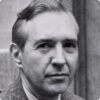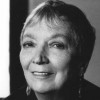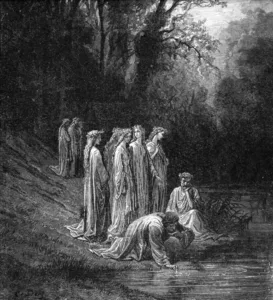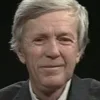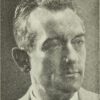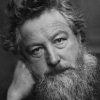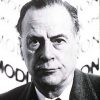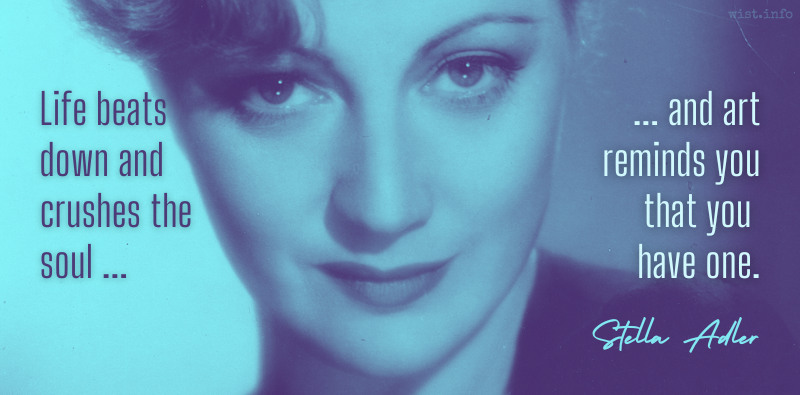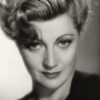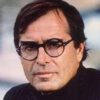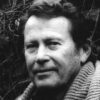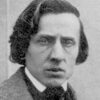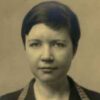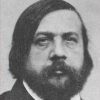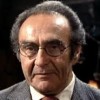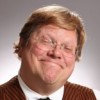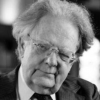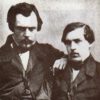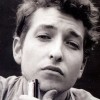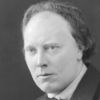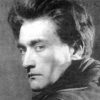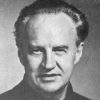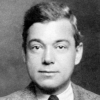HARRIS: I call it performance art, but my friend Ariel calls it wasting time. History will decide.
Steve Martin (b. 1945) American comedian, actor, writer, producer, musician
L. A. Story (1991)
(Source)
Quotations about:
art
Note not all quotations have been tagged, so Search may find additional quotes on this topic.
The greatest artists have never been men of taste. By never sophisticating their instincts they have never lost the awareness of the great simplicities, which they relish both from appetite and from the challenge these offer to skill in competition with popular art.
Jacques Barzun (1907-2012) French-American historian, educator, polymath
The Energies of Art: Studies of Authors Classic and Modern, “Whirligig: Last Words on Berlioz” (1956)
(Source)
The concentration of a small child at play is analogous to the concentration of the artist of any discipline. In real play, which is real concentration, the child is not only outside time, he is outside himself. He has thrown himself completely into whatever it is that he is doing. A child playing a game, building a sand castle, painting a picture, is completely in what he is doing. His self-consciousness is gone; his consciousness is wholly focused outside himself.
HARRIS: I call it performance art, but my friend Ariel calls it wasting time. History will decide.
Steve Martin (b. 1945) American comedian, actor, writer, producer, musician
L. A. Story (1991)
(Source)
Reader, had I the space to write at will,
I should, if only briefly, sing a praise
of that sweet draught. Would I were drinking still!
But I have filled all the pages planned
for this, my second, canticle, and Art
pulls at its iron bit with iron hand.[S’io avessi, lettor, più lungo spazio
da scrivere, i’ pur cantere’ in parte
lo dolce ber che mai non m’avria sazio;
ma perché piene son tutte le carte
ordite a questa cantica seconda,
non mi lascia più ir lo fren de l’arte.]Dante Alighieri (1265-1321) Italian poet
The Divine Comedy [Divina Commedia], Book 2 “Purgatorio,” Canto 33, l. 136ff (3.136-141) (1314) [tr. Ciardi (1961)]
(Source)
On drinking from the Eunoë, Dante gets meta, breaking the Fourth Wall and, having self-imposed limits on the number of cantos per book and lines in each canto, he uses "Art" as an excuse to draw toward a conclusion.
On the other hand, Sayers notes that Dante "is almost unique among medieval writers" in restraining his writing: "one of the reasons for his enduring readableness."
(Source (Italian)). Alternate translations:
If breath and vigour, by indulgent Heav'n,
To sing this bev'rage of the Gods were giv'n,
What holy rapture would exalt my Song!
To tell the unexhausted sweets that flow
From that blest Fountain o'er the Vale below.
And warm, with new desire, the votive Throng!
But now the Muse has run her fatal round,
And mark'd her Circle to the Second Bound.
[tr. Boyd (1802), st. 26-27]
Were further space allow’d,
Then, Reader, might I sing, though but in part,
That beverage, with whose sweetness I had ne’er
Been sated. But, since all the leaves are full,
Appointed for this second strain, mine art
With warning bridle checks me.
[tr. Cary (1814)]
Reader, had I but longer space to write,
I might describe to thee, in part, the taste
Of draught that's ever sweet, nor waste
The time; but leaves are all already full
Appointed for the second canticle,
Nor curb nor rein permit me use the will.
[tr. Bannerman (1850)]
If, Reader, I possessed a longer space
For writing it, I yet would sing in part
Of the sweet draught that ne'er would satiate me;
But inasmuch as full are all the leaves
Made ready for this second canticle,
The curb of art no farther lets me go.
[tr. Longfellow (1867)]
If I had, reader, longer space to write, I should sing, at all events in part, the sweet draught which never would have sated me; but, for that all the sheets put in frame for this second Canticle are full, the bridle of my art lets me go no further.
[tr. Butler (1885)]
Reader, if longer space to me were rated
For writing, I would strive to sing in part
That draught so sweet, which never could have sated.
But since is now completely filled the chart
Allotted for this second book, there leaves
No power to wander more the curb of Art.
[tr. Minchin (1885)]
If I had, Reader, longer space for writing I would yet partly sing the sweet draught which never would have sated me. But, because all the leaves destined for this second canticle are full, the curb of my art lets me go no further.
[tr. Norton (1892)]
If, reader, I had greater space for writing, I would sing, at least in part, of the sweet draught which never would have sated me;
but forasmuch as all the pages ordained for this second canticle are filled, the curb of art no further lets me go.
[tr. Okey (1901)]
If, reader, I had more space to write I should sing but in part the sweet draught which never would have sated me; but since all the sheets prepared for this second cantica are full the curb of art does not let me go farther.
[tr. Sinclair (1939)]
If, Reader, for the writing were more space,
That sweet fount, whence I ne'er could drink my fill,
Would I yet sing, though in imperfect praise.
But seeing that for this second canticle
The paper planned is full to the last page,
The bridle of art must needs constrain my will.
[tr. Binyon (1943)]
If for my writing, Reader, I'd more space,
I'd sing -- at least in part -- those sweets my heart
Might aye have drunk nor e'er known weariness;
But since I've filled the pages set apart
For this my second cantique, I'll pursue
No further, bridled by the curb of art.
[tr. Sayers (1955)]
If, reader, I had greater space for writing
I would yet partly sing the sweet draught
which never would have sated me.
but since all the pages ordained
for this second canticle are filled,
the curb of art lets me go no further.
[tr. Singleton (1973)]
Reader, if I had space to write more words,
I'd sing, at least in part, of that sweet draught
which never could have satisfied my thirst;
But now I have completed every page
planned for my poem's second canticle --
I am checked by the bridle of my art!
[tr. Musa (1981)]
If, reader, I had room to write more,
My poem could still not tell you everything
About the sweet drink of which I could never have had enough.
But since all the pages designed for this
Second part of the poem have been filled,
The rules of art stop me at this point.
[tr. Sisson (1981)]
If, reader, I had ampler space in which
to write, I'd sing -- though incompletely -- that
sweet draught for which my thirst was limitless;
but since all of the pages pre-disposed
for this, the second canticle, are full,
the curb of art will not let me continue.
[tr. Mandelbaum (1982)]
Reader, if I had more space to write, I would speak, partially at least, about that sweet drink, which would never have sated me: but because all the pages determined for the second Canticle are full, the curb of art lets me go no further.
[tr. Kline (2002)]
If, reader, I had more space to write, I would continue to sing in part the sweet drink that could never satiate me,
but because all the pages are filled that have been laid out for this second canticle, the bridle of art permits me to go no further.
[tr. Durling (2003)]
If, reader, I'd more space in which to write,
then I should sing in part about that drink,
so sweet I’d never have my fill of it.
However, since these pages now are full,
prepared by rights to take the second song,
the reins of art won't let me pass beyond.
[tr. Kirkpatrick (2007)]
If, reader, I had more ample space to write,
I should sing at least in part the sweetness
of the drink that never would have sated me,
but, since all the sheets
readied for this second canticle are full,
the curb of art lets me proceed no farther.
[tr. Hollander/Hollander (2007)]
O reader, if I had the space to tell you
More, I'd sing something about that sweetest
Drink, no quantity of which could ever
End my thirst, but because the pages meant
For this canto are already filled, my art prevents me,
Affirming limits I am forced to meet.
[tr. Raffel (2010)]
Indeed, it is a cruel truth of the history of all art and literature that most would-be poets, writers, and painters fail. The man or woman of real talent is rare, the born genius rarer still. For every book that survives the merciless judgment of time, there are nine hundred and ninety-nine rotting unread in libraries and nine thousand and ninety-nine that were never written in the first place.
Michael Harrington (1928-1989) American writer, political activist, political scientist [Edward Michael Harrington, Jr.]
Fragments of the Century, ch. 2 “The Death of Bohemia” (1973)
(Source)
It is erroneous to tie down individual genius to ideal models. Each person should do that, not which is best in itself, even supposing this could be known, but that which he can do best, which he will find out if left to himself. Spenser could not have written Paradise Lost, nor Milton the Faerie Queene. Those who aim at faultless regularity will only produce mediocrity, and no one ever approaches perfection except by stealth, and unknown to themselves.
William Hazlitt (1778-1830) English writer
“Thoughts on Taste,” Edinburgh Magazine (1819-07)
(Source)
A book is never finished, it is abandoned.
Gene Fowler (1890-1960) American journalist, author, and dramatist. [b. Eugene Devlan]
Quoted in H. Allen Smith, The Life and Legend of Gene Fowler, ch. 27 (1977)
(Source)
The most regretful people on earth are those who felt the call to creative work, who felt their own creative power restive and uprising, and gave to it neither power nor time.
I have never been in any rich man’s house which would not have looked the better for having a bonfire made outside of it of nine-tenths of all that it held.
William Morris (1834-1896) British textile designer, writer, socialist activist
“The Art of the People,” speech, Birmingham Society of Arts (1879-02-19)
(Source)
It is the function of art to renew our perception. What we are familiar with we cease to see. The writer shakes up the familiar scene, and as if by magic, we see a new meaning in it.
Anaïs Nin (1903-1977) Catalan-Cuban-French author, diarist
The Novel of the Future, ch. 2 “Abstraction” (1968)
(Source)
We are cups, constantly and quietly being filled.
The trick is knowing how to tip ourselves over and let the beautiful stuff out.Ray Bradbury (1920-2012) American writer, futurist, fabulist
“The Secret Mind,” The Writer (1965-11)
(Source)
Reprinted in Bradbury, Zen in the Art of Writing (1990).
I think of Art, at its most significant, as a DEW line, a Distant Early Warning system, that can always be relied on to tell the old culture what is beginning to happen to it.
Marshall McLuhan (1911-1980) Canadian philosopher, communication theorist, educator
Quoted in Richard Schickel, “Marshall McLuhan: Canada’s Intellectual Comet,” Harper’s Magazine (1965-11)
(Source)
Originality is a thing we constantly clamour for, and constantly quarrel with; as if, observes our author himself, any originality but our own could be expected to content us! In fact all strange thing are apt, without fault of theirs, to estrange us at first view, and unhappily scarcely anything is perfectly plain, but what is also perfectly common.
Thomas Carlyle (1795-1881) Scottish essayist and historian
“Jean Paul Friedrich Richter,” Edinburgh Review No. 91, Art. 7 (1827-7/10)
(Source)
A review of Heinrich Döring, Jean Paul Friedrich Richter's Life, with a Sketch of his Works (1826).
Great artists say that the most beautiful thing in the world is a little baby. Well, the next most beautiful thing is an old lady, for every wrinkle is a picture.
The aim of every artist is to arrest motion, which is life, by artificial means and hold it fixed so that a hundred years later, when a stranger looks at it, it moves again since it is life. Since man is mortal, the only immortality possible for him is to leave something behind him that is immortal since it will always move. This is the artist’s way of scribbling “Kilroy was here” on the wall of the final and irrevocable oblivion through which he must someday pass.
William Faulkner (1897-1962) American novelist
“The Art of Fiction,” Interview by Jean Stein, Paris Review #12 (Spring 1956)
(Source)
I feel that art has something to do with the achievement of stillness in the midst of chaos. A stillness that characterizes prayer, too, and the eye of the storm. I think that art has something to do with an arrest of attention in the midst of distraction.
Come to think of it, I don’t know that love has a point, which is what makes it so glorious. Sex has a point, in terms of relief and, sometimes, procreation, but love, like all art, as Oscar said, is quite useless. It is the useless things that make life worth living and that make life dangerous too: wine, love, art, beauty. Without them life is safe, but not worth bothering with.
Stephen Fry (b. 1957) British actor, writer, comedian
Moab Is My Washpot, “Falling In,” ch. 6 (1997)
(Source)
Referencing Oscar Wilde from the preface of The Picture of Dorian Gray (1890): "All art is quite useless".
The pleasures of the table — that lovely old-fashioned phrase — depict food as an art form, as a delightful part of civilized life. In spite of food fads, fitness programs, and health concerns, we must never lose sight of a beautifully conceived meal.
Life beats down and crushes the soul, and art reminds you that you have one.
Stella Adler (1901-1992) American actor and acting teacher
Quoted in Barry Paris, ed., Stella Adler on America’s Master Playwrights, Introduction (2012)
(Source)
The primary benefit of practicing any art, whether well or badly, is that it enables one’s soul to grow.
Kurt Vonnegut, Jr. (1922-2007) American novelist, journalist
“Despite Tough Guys, Life Is Not the Only School for Real Novelists,” New York Times (1999-05-24)
(Source)
Part of the Times "Writers on Writing" series.
In Man Without a Country, ch. 3 "Here Is a Lesson in Creative Writing" (2005), Vonnegut expanded on this:
Practicing an art, no matter how well or badly, is a way to make your soul grow, for heaven's sake. Sing in the shower. Dance to the radio. Tell stories. Write a poem to a friend, even a lousy poem. Do it as well as you possibly can. You will get an enormous reward. You will have created something.
Books aren’t just commodities; the profit motive is often in conflict with the aims of art. We live in capitalism, its power seems inescapable — but then, so did the divine right of kings. Any human power can be resisted and changed by human beings. Resistance and change often begin in art. Very often in our art, the art of words.
Ursula K. Le Guin (1929-2018) American writer
Speech, accepting the National Book Foundation Medal (19 Nov 2014)
(Source)
On receiving the National Book Foundation Medal for Distinguished Contribution to American Letters at the 65th National Book Awards. Video of the speech.
Perhaps the meaning of all human activity lies in the artistic consciousness, in the pointless and selfless creative act? Perhaps our capacity to create is evidence that we ourselves were created in the image and likeness of God?
Andrei Tarkovsky (1932-1986) Russian film director, screenwriter, film theorist [Андрей Арсеньевич Тарковский]
Sculpting in Time (1986) [tr. Hunter-Blair]
(Source)
Death is an endless night so awful to contemplate that it can make us love life and value it with such passion that it may be the ultimate cause of all joy and all art.
Paul Theroux (b. 1941) American novelist and travel writer
“D is for Death,” Hockney’s Alphabet (1991) [ed. Stephen Spender]
(Source)
Science and religion are two human enterprises sharing many features. They share these features also with other enterprises such as art, literature and music. The most salient features of all these enterprises are discipline and diversity. Discipline to submerge the individual fantasy in a greater whole. Diversity to give scope to the infinite variety of human souls and temperaments. Without discipline there can be no greatness. Without diversity there can be no freedom. Greatness for the enterprise, freedom for the individual — these are the two themes, contrasting but not incompatible, that make up the history of science and the history of religion.
Freeman Dyson (1923-2020) English-American theoretical physicist, mathematician, futurist
Infinite in All Directions, Part 1, ch. 1 “In Praise of Diversity” (1988)
(Source)
Based on a lecture on "Science and Religion," National Conference of Catholic Bishops, Detroit (Sep 1986).
Never try to convey your idea to the audience — it is a thankless and senseless task. Show them life, and they’ll find within themselves the means to assess and appreciate it.
The man who has stolen in order never to thieve again remains a thief. Nobody who has ever betrayed his principles can have a pure relationship with life. Therefore when a film-maker says he will produce a pot-boiler in order to give himself the strength and the means to make the film of his dreams — that is so much deception, or worse, self-deception. He will never now make his film.
Andrei Tarkovsky (1932-1986) Russian film director, screenwriter, film theorist [Андрей Арсеньевич Тарковский]
Sculpting in Time (1986) [tr. Hunter-Blair]
(Source)
Art is anything you can get away with.
Marshall McLuhan (1911-1980) Canadian philosopher, communication theorist, educator
The Medium is the Massage: An Inventory of Effects (1967) [with Quentin Fiore]
(Source)
More discussion of this quotation: Art Is Anything You Can Get Away With – Quote Investigator.
Art is born and takes hold wherever there is a timeless and insatiable longing for the spiritual, for the ideal: that longing which draws people to art. Modern art has taken the wrong turn in abandoning the search for the meaning of existence in order to affirm the value of the individual for his own sake.
Andrei Tarkovsky (1932-1986) Russian film director, screenwriter, film theorist [Андрей Арсеньевич Тарковский]
Sculpting in Time (1986) [tr. Hunter-Blair]
(Source)
The allotted function of art is not, as is often assumed, to put across ideas, to propagate thoughts, to serve as an example. The aim of art is to prepare a person for death, to plough and harrow his soul, rendering it capable of turning to good.
Andrei Tarkovsky (1932-1986) Russian film director, screenwriter, film theorist [Андрей Арсеньевич Тарковский]
Sculpting in Time (1986) [tr. Hunter-Blair]
(Source)
The relation between the artist and reality is an oblique one, and indeed there is no good art which is not consciously oblique. If you respect the reality of the world, you know that you can approach that reality only by indirect means.
Richard Wilbur (1921-2017) American poet, literary translator
“The Bottles Become New, Too” (1953), Responses: Prose Pieces, 1953-1976 (1976)
(Source)
Originally published in Quarterly Review of Literature, Vol. 7, No. 3 (1953).
Simplicity is the final achievement. After one has conquered all the difficulties, after one has played a vast quantity of notes and more notes, it is simplicity that emerges in all its charm as the crowning reward of art. Whoever wants to obtain this immediately will never achieve it: you can’t begin with the end. One has to have studied a lot, tremendously, to reach this goal; it’s no easy matter.
[La dernière chose c’est la simplicité. Après avoir épuisé toutes les difficultés, après avoir joué une immense quantité de notes, et de notes, c’est la simplicité qui sort avec tout son charme, comme le dernier sceau de l’art. Quiconque veut arriver de suite à cela n’y parviendra jamais, on ne peut commencer par la fin. II faut avoir étudié beaucoup, mème immensement pour atteindre ce but, ce n’est pas une chose facile.]
Frédéric Chopin (1810-1849) Polish composer and pianist
In the diary of Friederike Streicher (née Müller) (1840-04-21)
(Source)
When told by Müller that what impressed her most about Franz Liszt's playing was his "calmness in overcoming the greatest technical difficulties." Müller was a premiere student of Chopin, 1839-41. Excerpts from her diary are printed in Frederick Niecks, Frederick Chopin: As A Man and Musician, Vol. 2, Appendix 3 (1888).
The reason I can’t take myself seriously as a “creative artist,” Guy dear, is because I’m not one. It’s not somehow not in me to bear very patiently with my own mediocrity. If I can’t — and I can’t — be Shakespeare or Goethe, I’d rather raise good cabbages. And that is why I would not write at all, except that there is more money in writing than in cabbages, not only more money, but more freedom. […] This is why I’m not “filled with my art.” I ain’t got no art. I’ve got only a kind of craftsman’s skill, and make stories as I make biscuits or embroider underwear or wrap up packages.
Rose Wilder Lane (1886-1968) American journalist, travel writer, novelist, political theorist
Letter to Guy Moyston (25 Jun 1925)
(Source)
Quoted in William Holtz, The Ghost in the Little House: A Life of Rose Wilder Lane, ch. 9, sec. 5 (1995).
Art for Art’s Sake means, for its adepts, the pursuit of pure beauty — without any other consideration.
[L’art pour l’art signifie, pour les adeptes, un travail dégagé de toute préoccupation autre que celle du beau en lui-même.]
Théophile Gautier (1811-1872) French poet, writer, critic
L’Art Moderne, “Beauty in Art [Du Beau Dans L’Art]” (1856) [tr. Ruckstull (1925)]
(Source)
All passes. — Only strong art
Passes to eternity.
The bust
Survives the city.And the austere coin
That a workman finds
Underground
Reveals an emperor.[Tout passe. — L’art robuste
Seul a l’éternité,
Le buste
Survit à la cité.Et la médaille austère
Que trouve un laboureur
Sous terre
Révèle un empereur.]Théophile Gautier (1811-1872) French poet, writer, critic
“L’Art,” l. 41ff, Émaux et Camées (1852)
(Source)
(Source (French)). Alternate translations:
Everything passes. --
Only robust art is eternal.
The bust outlives the city.
And the simple coin
Unearthed by a peasant
Reveals the image of an emperor.
[Source]
All passes, Art alone
Enduring stays to us;
The Bust outlasts the throne, --
The Coin, Tiberius.
[Austin Dobson, "Ars Victrix" (1876), in imitation]
Everything passes -- Robust art
Alone is eternal.
The bust
Survives the city.
[Source]
Everything disappears -- Robust art
alone is eternal:
The Bust survives the city.
[Source]
Everything passes away. -- Robust Art
Alone has eternity;
The bust
Survives the city.
[Source]
I, having built a house, reject
The feud of eye and intellect,
And find in my experience proof
One pleasure runs from root to roof,
One thrust along a streamline arches
The sudden star, the budding larches.The force that makes the winter grow
Its feathered hexagons of snow,
and drives the bee to match at home
Their calculated honeycomb,
Is abacus and rose combined.
An icy sweetness fills my mind,A sense that under thing and wing
Lies, taut yet living, coiled, the spring.Jacob Bronowski (1908-1974) Polish-English humanist and mathematician
“The Abacus and the Rose” (1965)
(Source)
First published in Bronowski, Science and Human Values (1965 ed.).
It is true that most madboy devices are built for purely utilitarian purposes: I want to go faster; How can one person stack all of these starfish; I will gain the respect of my peers if I can turn this entire town into ham, and so on. But there are some things that burst forth from their creator’s brain simply because they want to make the world more aesthetically pleasing. So what if it doesn’t help one conquer the world? It looks awesome. It’s Art.
Phil Foglio (b. 1956) American writer, cartoonist
Agatha H. And the Clockwork Princess (2012) [with Kaja Foglio]
(Source)
Popular art is normally decried as vulgar by the cultivated people of its time; then it loses favour with its original audience as a new generation grows up; then it begins to merge into the softer lighting of “quaint” and cultivated people become interested in it, and finally it begins to take on the archaic dignity of the primitive.
Northrop Frye (1912-1991) Canadian literary critic and literary theorist
Anatomy of Criticism, “Mythical Phase: Symbol as Archetype” (1957)
(Source)
Physics is an organized body of knowledge about nature, and a student of it says that he is learning physics, not nature. Art, like nature, has to be distinguished from the systematic study of it, which is criticism.
Northrop Frye (1912-1991) Canadian literary critic and literary theorist
Anatomy of Criticism, “Polemical Introduction” (1957)
(Source)
Those who are concerned with the arts are often asked questions, not always sympathetic ones, about the use or value of what they are doing. It is probably impossible to answer such questions directly, or at any rate to answer the people who ask them.
Northrop Frye (1912-1991) Canadian literary critic and literary theorist
Anatomy of Criticism, “Polemical Introduction” (1957)
(Source)
Art’s distillation. Experience is wine, and art is the brandy we distill from it.
Robertson Davies (1913-1995) Canadian author, editor, publisher
A Mixture of Frailties, ch. 1 (1958)
(Source)
A painting in a museum probably hears more foolish remarks than anything else in the world .
[Ce qui entend le plus de bêtises dans le monde est peut-être un tableau de musée.]
The Brothers Goncourt - Edmond (1822-96) & Jules (1830-70), French writers [a.k.a. J.E. de Goncourt]
Idées et sensations (1866)
(Source)
Often mis-cited to just Edmond. Alternate translations:
The way you win as a creative person is to learn to love the work and not the applause.
Bob Dylan (b. 1941) American singer, songwriter
(Misattributed)
Attributed to Dylan, but it actually appears to be from an article by Brian Herzog, "Don't Write for Applause" (28 May 2015), which touched on Dylan.
Every work of art is one half of a secret handshake, a challenge that seeks the password, a heliograph flashed from a tower window, an act of hopeless optimism in the service of bottomless longing. Every great novel or comic book convenes the first meeting of a fan club whose membership stands forever at one but which maintains chapters in every city — in every cranium — in the world. Art, like fandom, asserts the possibility of fellowship in a world built entirely from the materials of solitude.
Art and Religion are, then, two roads by which men escape from circumstance to ecstasy.
The essence of all art is to have pleasure in giving pleasure.
Mikhail Baryshnikov (b. 1948) Latvian-American dancer, choreographer, actor
“Baryshnikov: Gotta Dance,” Time (19 May 1975)
(Source)
My definition of art is anything you do after the chores are done, and in that definition of art, Ron Jeremy, Picasso, and the mall Santa all have the exact same job.
Penn Jillette (b. 1955) American stage magician, actor, musician, author
Interview by Katherine Mangu-Ward, Reason (Jan 2017)
(Source)
There is a lot of folklore about equestrian statues, especially the ones with riders on them. There is said to be a code in the number and placement of the horse’s hooves: If one of the horse’s hooves is in the air, the rider was wounded in battle; two legs in the air means that the rider was killed in battle; three legs in the air indicates that the rider got lost on the way to the battle; and four legs in the air means that the sculptor was very, very clever. Five legs in the air means that there’s probably at least one other horse standing behind the horse you’re looking at; and the rider lying on the ground with his horse lying on top of him with all four legs in the air means that the rider was either a very incompetent horseman or owned a very bad-tempered horse.
You are astonished to find yourself the butt of so much calumny, opposition, indifference and ill-will. You will be more so and have more of it; it is the reward of the good and the beautiful: one may calculate the value of a man from the number of his critics and the importance of a work by the evil said of it.
Having a large audience does not, of course, prove that something is necessarily good. I subscribe to the theory that only a creation that speaks to succeeding generations can truly be labeled art.
Charles Schulz (1922-2000) American cartoonist
“My Life and Art with Charlie Brown and Others,” My Life with Charlie Brown (2010) [ed. Inge]
(Source)
No one has ever written, painted, sculpted, modeled, built, or invented except literally to get out of hell.
Antonin Artaud (1896-1948) French playwright, actor, director
Van Gogh, the Man Suicided by Society [Le Suicidé de la Société] (1947) [tr. Watson]
(Source)
Artists and scientists realize that no solution is ever final, but that each new creative step points the way to the next artistic or scientific problem. In contrast, those who embrace religious revelations and delusional systems tend to see them as unshakeable and permanent.
Anthony Storr (1920-2001) English psychiatrist and author
Feet of Clay: Saints, Sinners and Madmen, Introduction (1996)
(Source)
Stealing, of course, is a crime, and a very impolite thing to do. But like most impolite things, it is excusable under certain circumstances. Stealing is not excusable if, for instance, you are in a museum and you decide that a certain painting would look better in your house, and you simply grab the painting and take it there. But if you were very, very hungry, and you had no way of obtaining money, it might be excusable to grab the painting, take it to your house, and eat it.


